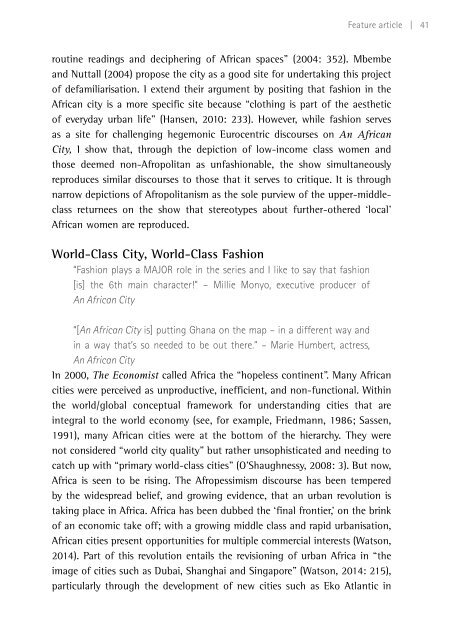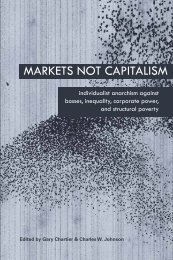The politics of fashion and beauty in Africa
fa21_proof_3
fa21_proof_3
Create successful ePaper yourself
Turn your PDF publications into a flip-book with our unique Google optimized e-Paper software.
Feature article | 41<br />
rout<strong>in</strong>e read<strong>in</strong>gs <strong>and</strong> decipher<strong>in</strong>g <strong>of</strong> <strong>Africa</strong>n spaces” (2004: 352). Mbembe<br />
<strong>and</strong> Nuttall (2004) propose the city as a good site for undertak<strong>in</strong>g this project<br />
<strong>of</strong> defamiliarisation. I extend their argument by posit<strong>in</strong>g that <strong>fashion</strong> <strong>in</strong> the<br />
<strong>Africa</strong>n city is a more specific site because “cloth<strong>in</strong>g is part <strong>of</strong> the aesthetic<br />
<strong>of</strong> everyday urban life” (Hansen, 2010: 233). However, while <strong>fashion</strong> serves<br />
as a site for challeng<strong>in</strong>g hegemonic Eurocentric discourses on An <strong>Africa</strong>n<br />
City, I show that, through the depiction <strong>of</strong> low-<strong>in</strong>come class women <strong>and</strong><br />
those deemed non-Afropolitan as un<strong>fashion</strong>able, the show simultaneously<br />
reproduces similar discourses to those that it serves to critique. It is through<br />
narrow depictions <strong>of</strong> Afropolitanism as the sole purview <strong>of</strong> the upper-middleclass<br />
returnees on the show that stereotypes about further-othered ‘local’<br />
<strong>Africa</strong>n women are reproduced.<br />
World-Class City, World-Class Fashion<br />
“Fashion plays a MAJOR role <strong>in</strong> the series <strong>and</strong> I like to say that <strong>fashion</strong><br />
[is] the 6th ma<strong>in</strong> character!” – Millie Monyo, executive producer <strong>of</strong><br />
An <strong>Africa</strong>n City<br />
“[An <strong>Africa</strong>n City is] putt<strong>in</strong>g Ghana on the map – <strong>in</strong> a different way <strong>and</strong><br />
<strong>in</strong> a way that’s so needed to be out there.” – Marie Humbert, actress,<br />
An <strong>Africa</strong>n City<br />
In 2000, <strong>The</strong> Economist called <strong>Africa</strong> the “hopeless cont<strong>in</strong>ent”. Many <strong>Africa</strong>n<br />
cities were perceived as unproductive, <strong>in</strong>efficient, <strong>and</strong> non-functional. With<strong>in</strong><br />
the world/global conceptual framework for underst<strong>and</strong><strong>in</strong>g cities that are<br />
<strong>in</strong>tegral to the world economy (see, for example, Friedmann, 1986; Sassen,<br />
1991), many <strong>Africa</strong>n cities were at the bottom <strong>of</strong> the hierarchy. <strong>The</strong>y were<br />
not considered “world city quality” but rather unsophisticated <strong>and</strong> need<strong>in</strong>g to<br />
catch up with “primary world-class cities” (O’Shaughnessy, 2008: 3). But now,<br />
<strong>Africa</strong> is seen to be ris<strong>in</strong>g. <strong>The</strong> Afropessimism discourse has been tempered<br />
by the widespread belief, <strong>and</strong> grow<strong>in</strong>g evidence, that an urban revolution is<br />
tak<strong>in</strong>g place <strong>in</strong> <strong>Africa</strong>. <strong>Africa</strong> has been dubbed the ‘f<strong>in</strong>al frontier,’ on the br<strong>in</strong>k<br />
<strong>of</strong> an economic take <strong>of</strong>f; with a grow<strong>in</strong>g middle class <strong>and</strong> rapid urbanisation,<br />
<strong>Africa</strong>n cities present opportunities for multiple commercial <strong>in</strong>terests (Watson,<br />
2014). Part <strong>of</strong> this revolution entails the revision<strong>in</strong>g <strong>of</strong> urban <strong>Africa</strong> <strong>in</strong> “the<br />
image <strong>of</strong> cities such as Dubai, Shanghai <strong>and</strong> S<strong>in</strong>gapore” (Watson, 2014: 215),<br />
particularly through the development <strong>of</strong> new cities such as Eko Atlantic <strong>in</strong>



